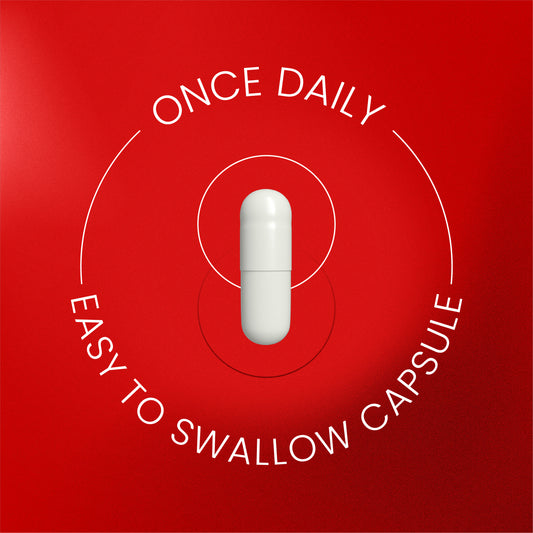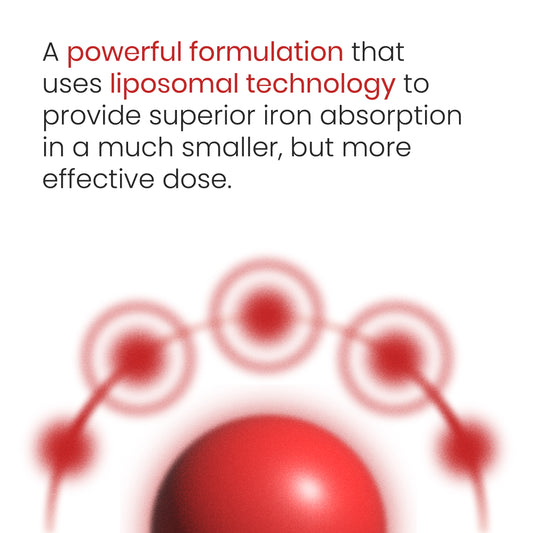

Are you that person who’s always yawning? Counting the hours until your next nap? Fighting to keep your eyes open at work? This one’s for you.
Low energy and chronic fatigue are signs that something is off-balance in your body. There are many potential causes of fatigue, from poor sleep to stress and iron deficiency. But there are just as many ways to pick your energy levels back up.
How do I know I have low energy?
There’s a difference between feeling sleepy sometimes and constantly needing a nap. Here are a few signs that you might be suffering from chronic fatigue:
- You feel extremely tired all the time
- Your fatigue is impacting your health and safety (for example, dozing off while driving)
- You consistently struggle to stay awake during work hours or social time
- You rarely feel motivated to exercise or complete daily activities
- You still feel tired after sleeping or resting
- It takes your body a long time to recover after exercising
- You struggle to think clearly, recall memories, or concentrate on a regular basis
How much sleep do I need to avoid fatigue?
For most adults, it’s recommended that you get about 7 hours of sleep or more per night. But it’s not just about how many hours of shut-eye you get. It’s also about what your body is doing during sleep.
While you sleep, your body releases growth hormones and repairs and regenerates cells so that you can wake up feeling refreshed and ready for the day. If you don’t get the recommended 7 hours or your sleep quality is poor, your body won’t have a chance to do this crucial cell clean-up.
Why do I feel so tired throughout the day, even when I’m getting enough sleep?
There are many potential reasons for fatigue and a lot of them have nothing to do with sleep.
Nutritional deficiencies
Your body needs a diverse set of nutrients and vitamins to run properly. If you’re low in one area, studies show that fatigue is one of the first symptoms. This is especially true for these common deficiencies:
- Iron
- B vitamins (B2, B3, B5, B6, B9, B12)
- Vitamin D
- Vitamin C
- Magnesium
There are several ways to turn nutritional deficiencies around, from diet to lifestyle changes to supplements. Choosing the right supplement can be really tough. A lot of supplements on the market aren’t effective and some even have nasty side effects.
It’s important to talk to your doctor about how best to treat your nutrient deficiency and which supplements are going to actually work (without causing more harm to your body). You’ll typically feel more energized once you restore these nutrient levels.
Stress
It’s normal to get a little stressed from time to time. But chronic stress can lead to even more chronic conditions, like fatigue and inflammation.
It can even cause a condition called stress-related exhaustion disorder (ED), which is pretty much exactly how it sounds—total exhaustion in your mind and body. Reducing stress is key to rejuvenating your energy levels and avoiding related health problems.
Diet
You really are what you eat. Most of the nutrients your body needs to thrive are sourced from food. Without a well-balanced diet of nutrient-dense foods, fatigue will inevitably set in.
Processed foods are also to blame. Added sugar and unhealthy fats can cause high blood sugar, interrupt your sleep pattern, and give you that lethargic, run-down feeling.
Beverages can cause fatigue too. Drinking coffee or energy drinks gives you that temporary burst of energy, but overconsumption can cause you to crash soon after. Then you drink more caffeine to compensate for the fatigue caused by the caffeine. See the problem?
Dehydration
Your body is constantly losing water throughout the day. If you don’t rehydrate, your body gets tired, your brain loses the ability to concentrate, and your sleep cycle gets all sorts of messed up. One study of over 26,000 adults found that poor hydration led directly to shorter sleep times and higher fatigue.
Obesity
Obesity is linked to multiple chronic conditions, from type 2 diabetes to heart disease and fatigue. It can also harm your sleep quality, which in turn causes more weight gain and fatigue.
If you’re overweight, talk to your doctor about a treatment plan to maintain a healthier body weight long-term.
Medical conditions
Insomnia, cancer, hypothyroidism, depression, diabetes, and kidney disease are all examples of conditions that can cause chronic fatigue. Talk to your doctor about your symptoms and the best course of treatment.
Other common causes of fatigue include drug and alcohol dependence, low exercise, overworking and/or shift work, and certain medications like steroids and antidepressants.
What functions of the body use up the most energy?
Even when you’re resting, your body is working. These essential bodily functions can use up more energy than you think. Circulation, respiration, digestion, and excretion are some of the top energy-exertors.
One organ might take the cake though. Your brain uses more energy than any other organ, accounting for about 20% of your body’s available energy. Most of that energy is spent sending signals between neurons and nerve cells.
What can I do in my daily routine to feel more energized?
Remember all the causes of chronic fatigue we told you about earlier? The trick to higher energy levels is to do the total opposite. Here’s a recap:
1. Reduce stress levels
There’s no one-size-fits-all method for easing stress. But these common stress relievers are a great place to start:
- Prioritize time every day to decompress (take a bath, meditate, go for a walk—you get the idea)
- Exercise regularly to lower cortisol levels and produce endorphins
- Try deep breathing or other forms of breathwork
- Talk to a therapist about your stress and tools to help ease it
- Do yoga, dancing, or other forms of movement that reduce stress
2. Drink lots of water (and less alcohol)
Hydration is important for every aspect of your health and energy is no exception. Dehydration leads directly to fatigue, but drinking even one glass of water can improve symptoms.
The National Academy of Medicine recommends drinking 9 to 13 cups of water per day. Keep a reusable water bottle handy at all times to make hydration as simple and convenient as possible.
While you’re at it, reduce your alcohol intake, especially before bed. This can improve your sleep, reduce dehydration, and make you feel refreshed and ready for the day when you wake up.
3. Get more exercise
One California State University study found that a quick 10-minute walk increased energy levels and kept them there for up to 2 hours. Even better: after 3 weeks of these walks, overall energy and mental health levels were significantly improved.
Make it a priority to get your heart rate up at least 3 times a week. There are so many ways to exercise, so find one that you really enjoy and make it a part of your weekly routine.
4. Eat breakfast
Your first meal sets the tone for the rest of your day. Eating a healthy, balanced breakfast in the morning supplies your body with all the energy it needs, resulting in a better mood and an easier sleep once the day is done.
5. Call your doc for a check-up
Life gets busy and we sometimes forget to check in on our general health. Things like thyroid function, blood cell count, and low iron can significantly impact your energy levels if they aren’t treated. Talk to your doctor about your fatigue and ask for tests to be done so you can better understand your overall health.
What can I change or add to my diet to feel more energized?
6. Eat more whole grains
There are so many benefits to eating whole, healthy grains, like brown rice and quinoa. Whole grains provide a steady source of fuel and insulin throughout the day. That means your energy levels can stay balanced, instead of dropping and spiking over and over.
7. Take your magnesium and B vitamins
Magnesium is a mineral used for over 300 biochemical reactions in your body—including breaking sugar down into energy. The recommended daily intake of magnesium is 300mg for women and 350mg for men. Popular sources of magnesium include fish, whole grains, and nuts like almonds, hazelnuts, and cashews.
B vitamins are equally as important for producing energy and delivering oxygen throughout the body. Still, about 40% of all adults in the US have a vitamin B12 deficiency. You can increase your vitamin B levels by taking a supplement or eating more B-rich foods, like fatty fish, beef, chicken, or eggs.
8. Go easy on the sweets
Sugar acts like a shock to your system. It causes a spike in blood sugar and a temporary energy burst—emphasis on the temporary. After the high, your blood sugar quickly drops and you’re suddenly ready for a nap.
Eating fewer sugary treats can support your blood sugar levels and keep your energy balanced.
9. Swap your americano for a latte
Yes, drinking too much coffee is bad for your energy levels. But a bit of caffeine can still be beneficial for fatigue, especially mixed with milk.
Pairing your espresso with a good amount of milk turns it into a protein drink of sorts. You get a burst of calcium and healthy fat along with a shot of energy.
10. Get more iron
Iron creates hemoglobin—a protein responsible for transporting oxygen from your lungs to the rest of your body. Oxygen is one of the main contributors to your energy levels. That’s why iron deficiency and anemia can quickly lead to extreme fatigue.
Foods high in iron include red meat, fish, and poultry. For vegans and vegetarians, iron can also be found in green leafy vegetables, beans, tofu, and iron-fortified grains. Learn more about iron and plant-based eating right here.
For most people, getting enough iron solely from food is difficult. That’s where an iron supplement comes in. When shopping for a supplement, make sure to choose one with the highest absorption rate possible, like Ferosom Forte.
What is the best iron supplement for energy levels?
Ferosom Forte has one of the highest absorption rates available. It’s microencapsulated in Liposomal form and infused with vitamin C for enhanced absorption.
What’s Liposomal form? It’s an advanced nutrient delivery system that increases absorption and bioavailability. The absorption rates of Liposomal iron are similar to certain doses of IV iron. Yep, it’s that good. For that reason, only a small dose is needed to do a world of good for your iron stores.
Ferosom Forte is also fortified with vitamin B12 and other essential nutrients, like vitamin C and folic acid. If you and your doctor think that iron might be to blame for your low energy levels, click here to learn more about how Ferosom Forte works and why it’s the best iron supplement for fatigue and low energy.




